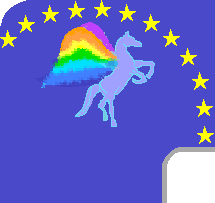

Interview:
John Follain meets Rocco Buttiglione
The
Sunday Times - Review November 07, 2004
Some beliefs you just can?t hold any more The professor of philosophy who with just a few words brought the European Union to a standstill, his name enough to torment Tony Blair and Silvio Berlusconi, sits snuffling on his white sofa. It?s all over for Rocco Buttiglione ? he has withdrawn his candidacy for the job of justice supremo at the European commission, and now he is sleeping badly and has caught a cold. Previously virtually unknown outside Italy, where he is minister for European affairs, Buttiglione, 56, became notorious last month after saying the family allows ?women to have children and be protected by their husbands? and that ?homosexuality is a sin?. He was also quoted as saying that single mothers are ?not very good?. Soon the knives were out, and under pressure from Socialist MEPs, the second-largest grouping in the European parliament, Jose Manuel Barroso, negotiated furiously to draw up a new slate. After Buttiglione finally pulled out, a reshuffled team was unveiled last Thursday, with Franco Frattini, Italy?s foreign minister, taking his place.
?Il professore,? as Buttiglione is known in Italy, hardly looks like trouble. Tall and owl-eyed, he speaks in a voice barely above a whisper at his spacious flat in a bourgeois neighbourhood of Rome. For his first interview since resigning last week, he kindly offers to talk either in Italian or English ? he speaks six languages. How perfect for an EU job. But despite the sniffing there is plenty of fight left in him, he quickly denounces those who have brought him low. ?I am the victim of a new form of creeping totalitarianism, which forbids the asking of certain questions. Anyone who doesn?t accept that is excommunicated,? he says. That last word is indicative ? Buttiglione often refers to his Roman Catholic faith, and he has no difficulty admitting that he went into politics in 1993 after Italian bishops had appealed to Catholics to enter politics following the collapse of the Christian Democrats, a party destroyed by anti-corruption investigations. Yes, he did say at the Euro-MPs? hearing that homosexuality was a sin, but he insists that in the same breath he made clear that this had no political implications. ?I stand for the principle of non-discrimination, and if all sinners were to be black sheep, no one would escape as we are all sinners before God. I don?t pretend to be any better than a homosexual. ?I am also a sinner, not in that respect, but perhaps in other respects which are even worse,? he explains. What sins might those be? Buttiglione exclaims with a broad grin: ?Oh, you are not my confessor!
I shall not tell you.? Then, serious again: ?Sin is such an emotionally charged word, and so few people know what sin is. ?It?s strange, most people don?t want to hear about sin, but in their homes they feel extremely sinful, and they don?t know how to find forgiveness.? The pre-eminent place that Buttiglione gives to religious and moral values is an uncanny echo of the election campaign waged across the Atlantic by President George W Bush. On his re-election Bush committed himself to ?maintaining the most profound values of the family and the faith?, an implicit reference to issues such as gay marriages and abortion. One survey by the Associated Press news agency showed that ?moral values? were the priority for many voters, most of whom voted for Bush, in closely fought states. In the ?what if?? school of history, perhaps if Buttiglione had kept religious discussion out of his grilling by Euro-MPs, or simply fobbed them off with a few bland statements, he would be ensconced in a Brussels office by now. But this is no calculating politician, who would speak only when certain of a favourable impact on his own popularity. Censoring himself is such an alien concept that Buttiglione pauses at length before saying: ?Maybe it would have been possible for me not to speak, but do we want a Europe in which there is a free exchange of opinions, or do we want a Europe in which we always hide behind banalities? Unfortunately, the philosophy I have studied has made it difficult for me to speak without saying anything.?
He is angry with the media for, he says, waging a ?superficial and crude? campaign against him. His comments on homosexuality were in line with the Roman Catholic church?s teachings. As for his comments on single mothers, they were a joke, he says, part of a speech in which he was advocating closer ties between Europe, the single mother, and America. Nobody was more surprised than Buttiglione when his comments unleashed a storm. Immediately after the hearing many Euro-MPs had come up to him to congratulate him on his performance ? including several left-wing parliamentarians, but he is not naming names. For two weeks Buttiglione stuck to his guns in the face of what he has provocatively branded an anti-Catholic ?Inquisition?, determined to find a solution that would allow him to stay on the commission team. He was convinced that the controversy was really about freedom of conscience, and his right not to be discriminated against on religious grounds. Many showed their support. He received thousands of positive letters and e-mails. People stopped him in the street and told him ?We?re with you.? Thirteen senior British conservative Euro-MPs sent a supprtive letter.
At one meeting of the would-be commissioners, Buttiglione saw his colleague, Peter Mandelson, who had described the Italian?s comments as ?unwise?. Buttiglione went up to him. ?I wanted to clarify things with him but not only that. Human beings deserve respect, and I didn?t want Mandelson to think that I didn?t respect him. ?Mandelson gave me the impression of being an intelligent man who lives his homosexuality without fanaticism and who was ready to listen. ?He was very fair, and I liked the fact that he had taken the trouble of looking up precisely what I had said,? Buttiglione says. Barroso supported Buttiglione too, but on October 26, the day before the European parliament was due to vote on the commission, Barroso told him: ?Rocco, I don?t think we will have a majority.? Buttiglione thought for a short while, and then started writing his letter of resignation. Nobody pressured him into doing this, he insists. ?If you are climbing a mountain and you are tied to other climbers with a rope, and if you fall, you must see the moment in which, if you don?t cut the rope, you will drag all of them down with you. And, of course, you don?t want to drag them down,? he says. But Buttiglione held on to the rope for another four days. He didn?t send the letter off immediately because he received a call from Hans-Gert Poettering, head of the European People?s party group in parliament. Poettering asked him not to quit, saying the group would have refused to vote for a commission in which Buttiglione did not feature.
After Barroso postponed the vote, the way was clear for Buttiglione to resign at a moment which, as he puts it, ?was the best for the commission and the least worst for my party and my government?. Pope John Paul II, a friend, intervened publicly, calling for a resolution of the crisis by ?reciprocal respect in a spirit of goodwill?. It was the least the pope could do, given that Buttiglione had helped write some of the pontiff?s encyclicals ? documents that Roman Catholics are expected to obey. The resignation, announced at a press conference, followed a late-night meeting with his prime minister, Berlusconi, who in ?an act of friendship? left it completely up to him to decide what to do. The only moment during our interview when Buttiglione suddenly clammed up was when asked about a previously unpublished comment which, according to an official who overheard it, Blair made to him at the Rome ceremony for the signing of the EU?s constitution. Blair approached him and said: ?It?s a completely stupid thing.? But Buttiglione, who looked startled at mention of the episode, would only say: ?I had no exchange with Blair.? Could he be being disingenuous? As he is aware, Blair has unsettled Labour Euro-MPs who feel he has not taken a strong enough stand in their favour against Buttiglione, and Blair?s remark is the clearest indication of his opinion on the controversy.
In typically professorial style, Buttiglione explained his motive for resigning with two maxims that he quoted in Latin before translating: ?The salvation of the country should be the highest law? and ?Let justice be done even if the world should collapse.? Roman Catholic faith, rather than Latin maxims, saw Buttiglione through the crisis: ?It?s a difficult thing to talk about, but faith is not something with an identity that is separate from you. Faith is what you are. I entered politics to bear witness to some values, and this was a time in which it was clear what my conscience demanded of me.? Looking back, he is happy ? he balks at the word proud ? that he had the strength to cling to his position and his ?moral personality?. He is thankful to his family ? his wife, his four daughters and his son-in-law ? for their help, and says the experience has strengthened the family ties. His wife works but he wants her kept out of the limelight and doesn?t want details of her job published. His greatest concern now is that his ordeal will not be in vain. ?I don?t want to see similar totalitarianism in the future,? he says. Many people seem to fear, he says, that if religion is allowed to influence social and political decisions, then tolerance, pluralism and human liberty will disappear. But for him, and it is a stand he will continue to fight for, a clear moral vision is an essential part of the political debate. And the professor concluded with a quotation from Thomas More, whose head went under the axe during the reign of Henry VIII because he stood by his principles: ?Man cannot be separated from God, nor can the affairs of state be separated from morality.? .
L'articolo tradotto in Italiano.
by www.osservatoriosullalegalita.org
___________
I CONTENUTI DEL SITO POSSONO ESSERE PRELEVATI CITANDO E LINKANDO LA FONTE